With the RNC coming to blue Milwaukee, historical tensions brew in the background
- Oops!Something went wrong.Please try again later.
WASHINGTON – When Donald Trump called Milwaukee a "horrible city" during a closed meeting with fellow Republicans last month, he touched on an enduring trend in Wisconsin politics.
Milwaukee has for decades been at the center of budget battles in the statehouse, and it is frequently singled out by the GOP in statewide campaigns as an emblem of dysfunction. Democrats have accused Republicans of making the city a political pin cushion, though Republicans maintain that their state-level intervention — and at times criticism — is for the better.
The former president's comments, made just a month before he plans to accept the Republican presidential nomination in the city, only served to highlight that friction.
“There were certainly times when we treated Milwaukee as a punching bag,” Republican U.S. Rep. Tom Tiffany, a former state lawmaker and member of the state Legislature's powerful budget-writing committee, said in an interview a week before Trump made his remarks. “But it’s the biggest city in Wisconsin. It’s a very important city, and there’s a tremendous amount of economic activity and cultural activity that goes on in the city, so it’s really critical to the state.”
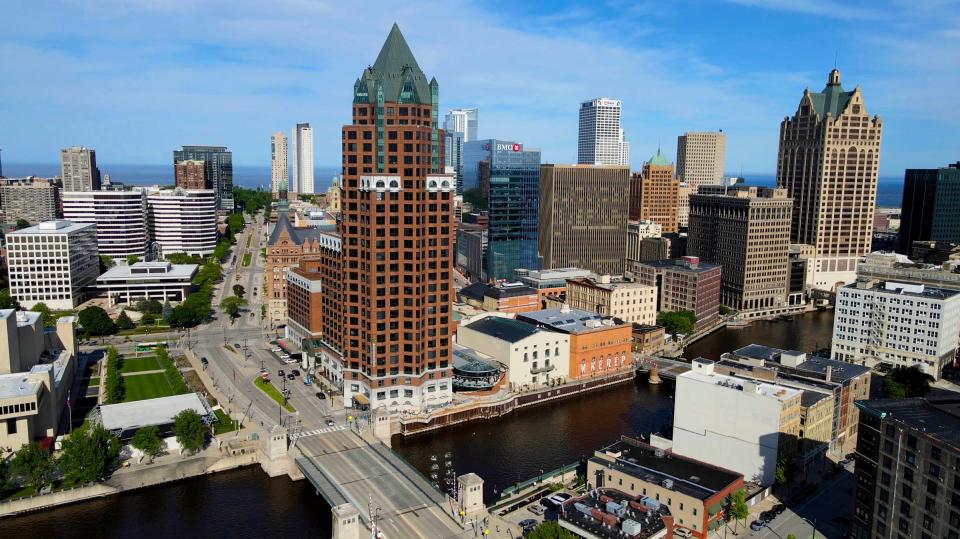
The relationship between Republicans and Milwaukee, a blue city and key component of Democrats’ success in the swing state, will be on full display during the Republican National Convention, set for July 15-18. Republicans have likened the event to staging “four Super Bowls in a row” and claimed it will bring millions of dollars to the city. RNC host committee chairman Reince Priebus called the event a “game-changer” for Milwaukee.
But that rhetoric has not always been so upbeat.
Milwaukee is frequently pilloried by Republicans on the campaign trail for crime, which has trended downward this year, and been at the center of wide-ranging and false claims of election fraud. In Madison, the two parties have clashed over everything from how much revenue the city can recoup from the state and how the public school system operates to the makeup of its police and fire commission.
The contrast has led some Democrats to accuse their counterparts of insincerity. As one Democrat characterized it: Republicans’ “hyperbolic bashing of Milwaukee” doesn’t square with the party’s “newfound love of our community” ahead of a convention that will put the eyes of the political world on Wisconsin.
“I would put it firmly in the camp of hypocrisy,” state Sen. Chris Larson, a Milwaukee Democrat elected in 2010, said of Republicans touting Milwaukee ahead of the convention. “They have spent my entire time in the Legislature and generations before that bashing Milwaukee and bashing every urban center across the country.”
“They’re always beating up on Milwaukee,” said U.S. Rep. Gwen Moore, a Democrat who has represented Milwaukee at the state and federal level since 1989. “For as long as I can remember, this has been an issue.”
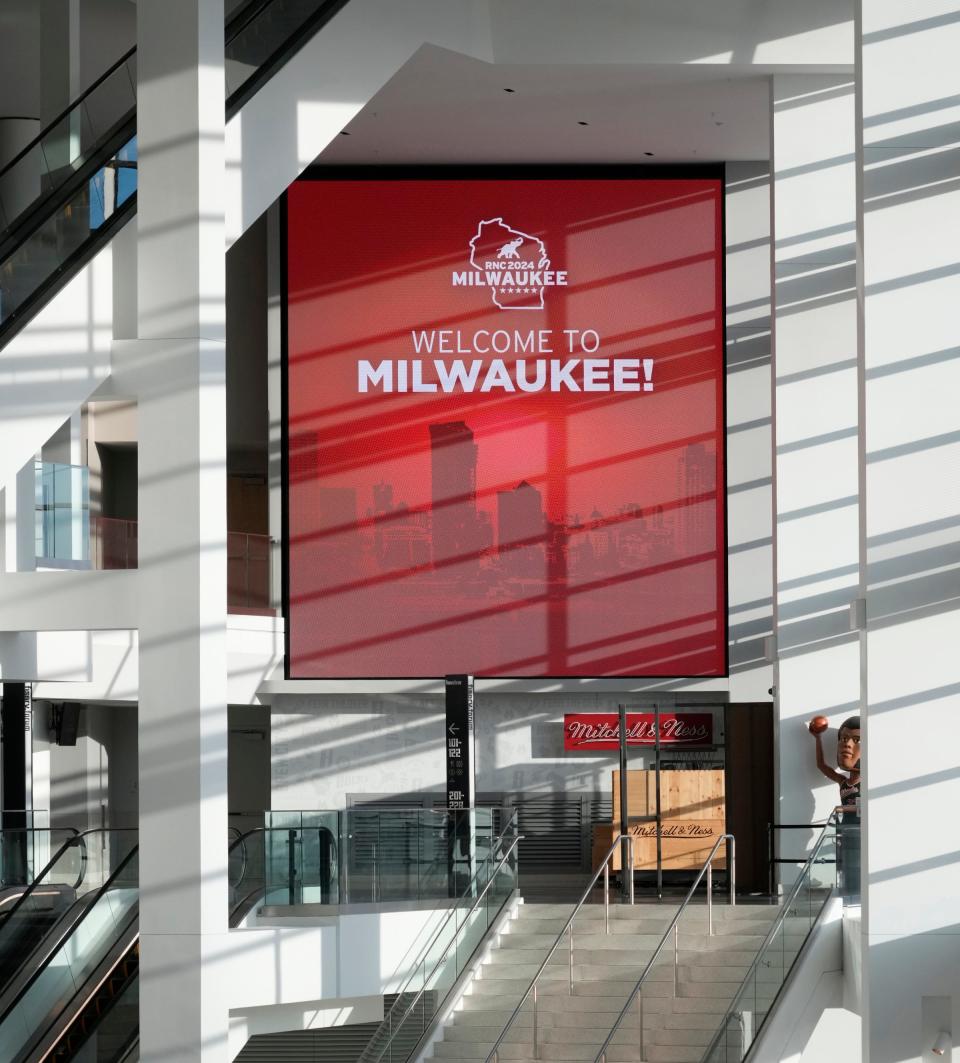
RNC could give GOP a platform for its case against Democratic leadership
In choosing Milwaukee as a host city for the 2024 GOP national convention, Republicans may see an opportunity to illustrate their arguments against Democratic leadership.
"Republicans are having a harder time when it comes to picking a city for their national conventions. Big cities have become more Democratic in recent years and the GOP's messaging is increasing about the ills of big cities, including problems like crime, culture and failing schools," said Barry Burden, a political science professor at the University of Wisconsin-Madison and director of the university's Elections Research Center. "Being in a big city is an opportunity for Republicans to emphasize their arguments about Democrats having failed to govern urban centers effectively."
"It's awkward to insult one's hosts," Burden added, "but Republicans will be compelled to do it because they are stuck in the belly of the beast they usually disdain."
For Democrats, Trump's comments last month, which his campaign claimed were references to election integrity concerns and crime, were an example of just that — a confirmation Republicans would use the platform to continue a campaign against Milwaukee.
Wisconsin Republicans offered conflicting explanations for their nominee's words, though they all denied Trump was speaking about the people of the battleground state's largest city when he referred to Milwaukee as "horrible." The state GOP party, meanwhile, said Trump was "correct to highlight the embarrassing mismanagement of elections in Milwaukee."
Tensions between Milwaukee, GOP flare in state Legislature
The tensions between the state’s largest city and Republicans, who have controlled the state Legislature for more than a decade, are nothing new.
At one point in 2019, members of the Legislature's budget-writing committee clashed over state funding levels for Milwaukee's child welfare agency — a responsibility the budget committee chairman from Dodge County described as being at the expense of other communities in the state that do not rely on state officials to help run their local programs.
"We should be asking why you are not thanking us," Rep. Mark Born, R-Beaver Dam, said about state funds paid by taxpayers elsewhere going to Milwaukee's child protective services, which is overseen by state officials unlike in other counties.
"You say it's been a screwing of Milwaukee," Born said to state Rep. Evan Goyke, D-Milwaukee. "I'd say it's been a screwing in the opposite direction and we're going to stop that tonight."
Democrats representing Milwaukee on the committee blasted their Republican colleagues over moves they described as undercutting the state's largest city and accused their GOP colleagues of racism.
"Seventy-two percent of this state's poor resides in Milwaukee," Sen. LaTonya Johnson, D-Milwaukee, said at the time. "Milwaukee always finds itself at the front and center of the firing squad, yet we can't figure out why Milwaukee doesn't have the resources that it needs to take care of its own poor."
The 2022 GOP primary in the last governor's race focused almost exclusively on crime, voting and education in Milwaukee, with some candidates calling to dissolve the state's largest school district amid persistently low academic outcomes.
During election years, GOP candidates often single out Milwaukee for crime, a problem that has plagued the city. From 2019 to 2022, the city broke its homicide record three years in a row.
In his gubernatorial bid last cycle, for example, Republican construction executive Tim Michels zeroed in on the city as he made crime a central issue in his campaign and painted Democratic Gov. Tony Evers as being soft on criminals, focusing on the state's parole process and highlighting examples of violent criminals being released early.
It’s trends like those, Republicans say, that have led them to speak up at the state level.
“Milwaukee’s problem is they keep voting for left-wing Democrats,” said U.S. Rep. Glenn Grothman, who entered the state Legislature in 2003 before being elected to Congress in 2014. “Whether you’re talking about their schools, whether you’re talking about their crime, they have made a mess of Milwaukee.”
“There shouldn’t be that much crime, but they elect people who are — be it the district attorney or judges — soft on crime,” Grothman said. “Should the Legislature step in and do something? Well, they’re screwing up their city.”
In interviews, a number of Wisconsin Democrats pointed to recent budget discussions in the statehouse as evidence of recent clashes with Republicans.
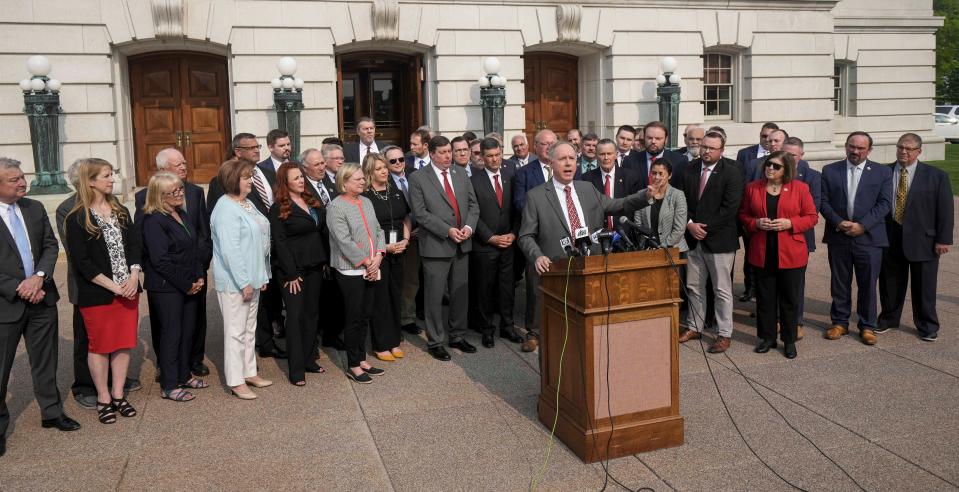
They noted measures like the shared revenue increase passed last year that they complained gave Milwaukee less money than other communities across the state. The legislation saved Milwaukee from a fiscal crisis and gave the city the ability to implement a new sales tax, though it came with conditions, including limiting the city's ability to spend tax money on priorities such as diversity, equity and inclusion — efforts that Republicans deemed "woke."
Republicans agreed to the proposal in exchange for Evers’ support for a bill to increase funding for private school vouchers, leading Johnson, the Democratic Milwaukee state senator, to remark that Evers “had a gun to his head."
“Either he gave my colleagues what they wanted, or Milwaukee went into insolvency,” Johnson said. “And he chose to save Milwaukee.”
Others recalled Republican opposition to lead pipe replacement funding because the majority of the money would go to Milwaukee — an epicenter of the problem in the state — and legislation requiring Milwaukee and Milwaukee County to take on larger costs for renovations to American Family Field, where the Brewers play.
In an interview, Johnson said she welcomes the GOP national convention but wants her Republican colleagues to abandon the us vs. them mentality when it comes to Milwaukee.
"You don't get to utilize our city and then not care about its people," Johnson said, pointing to legislation she proposed to GOP colleagues that would allow some gun restrictions in Milwaukee only to curb violence in the city.
"You know what they told me, 'my heart aches for you, but that's not happening in our district,'" Johnson said. "How can you honestly say, 'that's not happening in my district,' when kids are being killed? That's the same thing as saying that as long as those kids continue to look like you, it's not important to me."
Several former and current top Wisconsin Republicans told the Journal Sentinel their scrutiny of Milwaukee stems from what they described as efforts to hold a heavily Democratic city accountable for the state support it receives.
Former Republican Gov. Scott Walker in an interview described the relationship between Republicans and the city as “complicated” but said GOP frustrations are “typically tied in towards elected officials in Milwaukee, not necessarily the people of Milwaukee.”
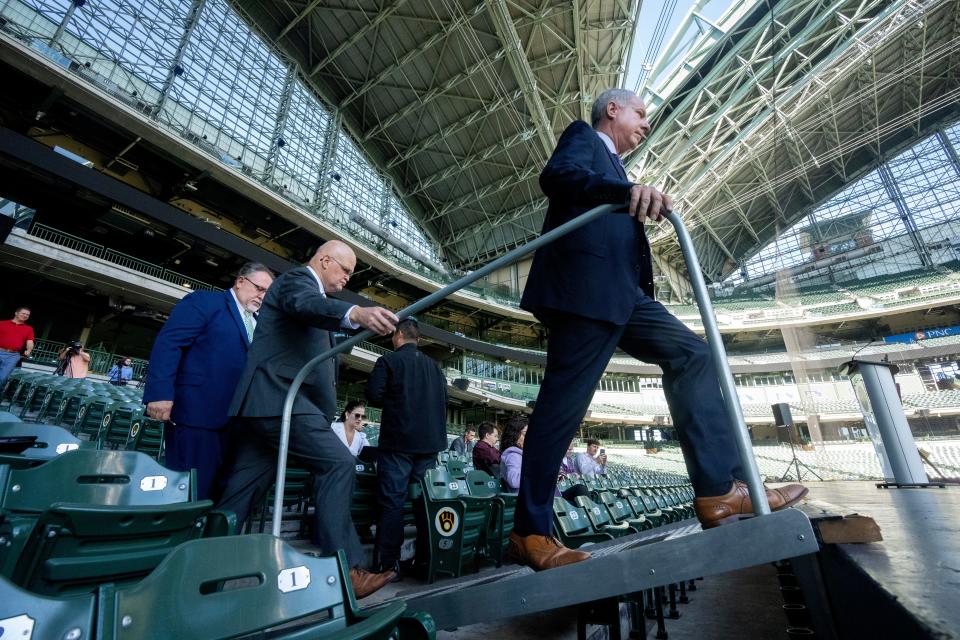
“I think part of the reason at least some Republicans were historically upset was because it wasn’t just the money they spent,” Walker said. “They felt the results weren’t effective.”
Both Walker and fellow former Republican Gov. Tommy Thompson pointed to their efforts to expand school choice — an issue that has divided the two parties — as a positive for the city. And Thompson credited himself with keeping the Brewers in Milwaukee.
Thompson — who in 1995 famously said he would “stick it” to Milwaukee and Waukesha counties when talking about taxing counties for a new Brewers ballpark, a comment he apologized for — carried deep blue Dane County in one gubernatorial reelection bid and was the only statewide Republican in recent history to win Milwaukee County, something he did three times.
He told the Journal Sentinel that bringing the RNC to the city is a “pretty strong indication that Republicans love Milwaukee,” but he acknowledged the friction between the parties.
“I think it’s just the fact that when you have Republicans in control of government, the Legislature, and you have only Democrats, predominantly Democrats, representing the city of Milwaukee and Milwaukee County, you’re not going to develop the rapport that you would like to,” Thompson said.
U.S. Rep. Scott Fitzgerald, the former GOP leader in the state Senate, brushed off comments that Milwaukee has been treated as a punching bag as “unserious.” He pointed to the 2015 bipartisan deal to finance the construction of Fiserv Forum for the Milwaukee Bucks as evidence of positive collaboration.
“If you think about it, everything that’s kind of high-profile that’s come up in the city, besides the sales tax that they just did, had Republican support,” Fitzgerald told the Journal Sentinel.
“Any serious legislator understands that Milwaukee needs to be strong if the state is going to do well,” Fitzgerald said.
Burden, the political science professor, said few states exhibit a dynamic similar to the push and pull between the largest city in the state and the state's lawmakers. In Illinois, for example, Chicago is often criticized by downstate lawmakers, but Chicago-area lawmakers have much more influence in the statehouse.
"Many states such as Ohio have more than one major urban area, so there's less focus on a single standout city. States such as New York and Minnesota do not have such partisan hostility because Democrats are in charge of state government and run the cities," Burden said.
Milwaukee, though, remains at the center of debate in Wisconsin.
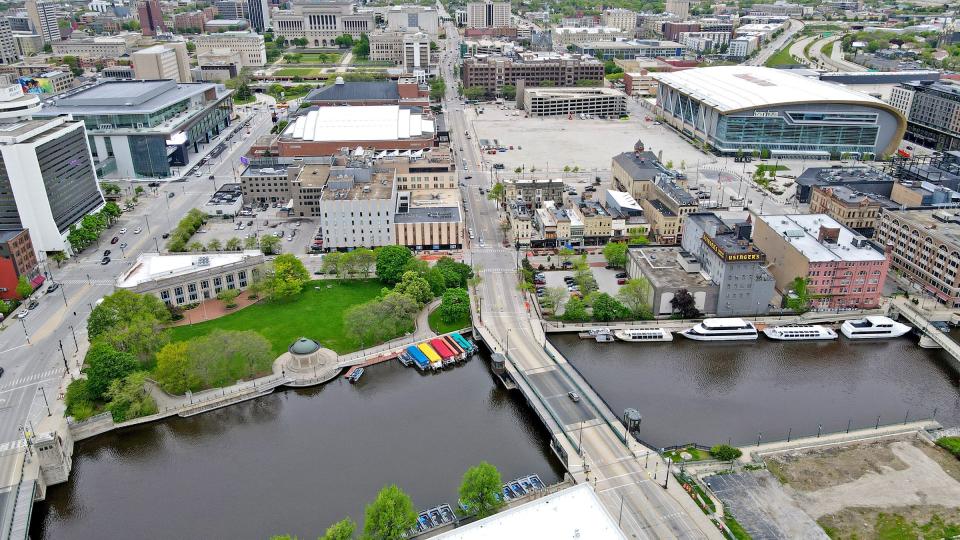
In recent elections, Republicans have made the city a focal point in election challenges. In the hours after the 2020 presidential election was projected to be called for President Joe Biden, Trump in a news conference suggested the outcome was fraudulent because of Milwaukee's late-night posting of results, for example.
Trump ultimately paid for recounts of ballots in Milwaukee and Dane counties and sought to throw out all ballots that were not cast on Election Day. But the process ended up confirming Biden's victory.
This year, the GOP has made a push to recruit poll watchers and attorneys to monitor election proceedings, with a particular emphasis on Milwaukee and Madison — something Democrats like Moore, the congresswoman from Milwaukee, have labeled intimidation tactics.
Still, Republicans have claimed the relationship between the party and Wisconsin’s biggest city has improved in recent years under new leadership.
“You can find difficulty,” Thompson, the former GOP governor, said. “But I’m here to tell you I think the relationship for this convention with the city mayor and the county exec both coming on enthusiastically … that tells you that there’s a sense of friendliness and rapport that’s going to carry on into next year.”
Trump's labeling of Milwaukee as a "horrible city," however, will likely hang over the convention.
"They're gonna spend the time — you can bet good money on it — that they're going to disparage our community while they're here," Larson, the Milwaukee state senator, said in late May, "and hope to get props for being brave just for being here while they're trying to rip apart our city."
This article originally appeared on Milwaukee Journal Sentinel: With the RNC in Milwaukee, historical tensions brew in the background

